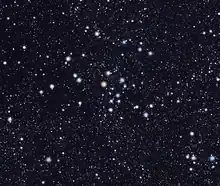| NGC 2451 | |
|---|---|
 NGC 2451 (taken from Stellarium) | |
| Observation data (J2000 epoch) | |
| Right ascension | 07h 45m 24.0s[1] |
| Declination | −37° 57′ 00″[1] |
| Distance | 600 ly (NGC 2451A), 1,200 ly (NGC 2451B)[1] |
| Apparent magnitude (V) | 3[1] |
| Apparent dimensions (V) | 45″[1] |
| Physical characteristics | |
| Other designations | Cr 161 |
| Associations | |
| Constellation | Puppis |
NGC 2451 is an open cluster in the Puppis constellation, probably discovered by Giovanni Battista Hodierna before 1654 and John Herschel in 1835.[1] In 1994, it was postulated that this was actually two open clusters that lie along the same line of sight. This was confirmed in 1996. The respective clusters are labeled NGC 2451 A and NGC 2451 B, and they are located at distances of 600 and 1,200 light-years, respectively.[2]
References
- 1 2 3 4 5 6 Seligman, Courtney. "Celestial Atlas: NGC Objects: NGC 2450 - 2499". cseligman.com. Archived from the original on 1 January 2016. Retrieved 10 July 2015.
- ↑ Pöhnl, H.; Maitzen, H. M.; Paunzen, E. (April 2003). "On the evolutionary status of chemically peculiar stars of the upper main sequence". Astronomy and Astrophysics. 402: 247–252. arXiv:astro-ph/0303189. Bibcode:2003A&A...402..247P. doi:10.1051/0004-6361:20030266. S2CID 7215863.
External links
 Media related to NGC 2451 at Wikimedia Commons
Media related to NGC 2451 at Wikimedia Commons- NGC 2451 @ SEDS NGC objects pages
- NGC 2451 on WikiSky: DSS2, SDSS, GALEX, IRAS, Hydrogen α, X-Ray, Astrophoto, Sky Map, Articles and images
This article is issued from Wikipedia. The text is licensed under Creative Commons - Attribution - Sharealike. Additional terms may apply for the media files.